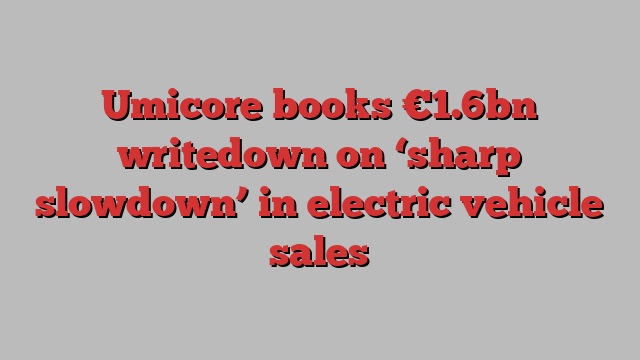
Unlock the Editor’s Digest for free
Roula Khalaf, Editor of the FT, selects her favourite stories in this weekly newsletter.
Belgian chemicals group Umicore has taken a €1.6bn impairment on its battery materials business as a “sharp slowdown” in global electric car sales rips through the supply chain.
The European battery materials producer said it now expected at least 18 months of delays in the “ramp-up” of customer demand, prompting it to cut back further expansion in Europe and South Korea for its battery materials unit — which is still forecast to be lossmaking in 2025 and 2026 — to avoid its factories being underused.
The group also delayed plans for a large battery recycling plant in Europe to no earlier than 2032, from a previous target of 2026, because of lower forecasted amounts of battery plant scrap and used electric vehicles to recycle.
New chief executive Bart Sap said: “In recent months, short- and medium-term growth projections for the electric vehicles market have been scaled back substantially, significantly affecting Umicore’s battery materials business.”
“The large impairment of our battery materials assets is painful and reflects the changed situation as we see it today.”
The writedown comes after Umicore slashed its profit forecast for the division last month because of a slowdown in electric vehicle demand as European carmakers wound back plans to sell EVs.
Sales for Tesla, the world’s largest EV maker by volume, were down year on year in the second quarter, leading to a steep profit drop, while collapses in earnings for Nissan and Stellantis on Thursday underlined the struggle to get drivers to buy EVs after the companies invested billions of dollars in them.
Sap said during an analyst call that car manufacturers were not only scaling back on EV plans but changing the “regional configuration”. He added that it would review plans to build a C$2.7bn ($2bn) battery materials plant in Ontario, which Ottawa and the federal government promised to heavily subsidise.
Umicore is using cash flow from its existing cash-generative business — producing catalytic converters from platinum metals that reduce harmful emissions in combustion-engine cars — to fund hundreds of millions of euros of spending on battery material production sites.
The writedown wipes out more than half of the unit’s carrying book value, leaving it at €1.5bn, and Umicore only expects returns above the cost of capital to be achieved in the “last years of this decade”.
Umicore’s shares were largely unmoved on Friday but are trading at their lowest level since 2011.
Carmakers and suppliers for EV makers expected growth exceeding 20 per cent each year to continue. But this year has shocked them, with Umicore’s sales of cathode materials — one of the battery’s two electrodes — flat and revenues down 33 per cent in the first half of 2024 compared with last year.
For the full year, the Brussels-based group expects volumes for battery materials to be equal to or slightly below last year.
Earnings before interest, tax, depreciation and amortisation at the group level, including the legacy businesses, is forecast to be €760mn to €800mn, down from €972mn last year.